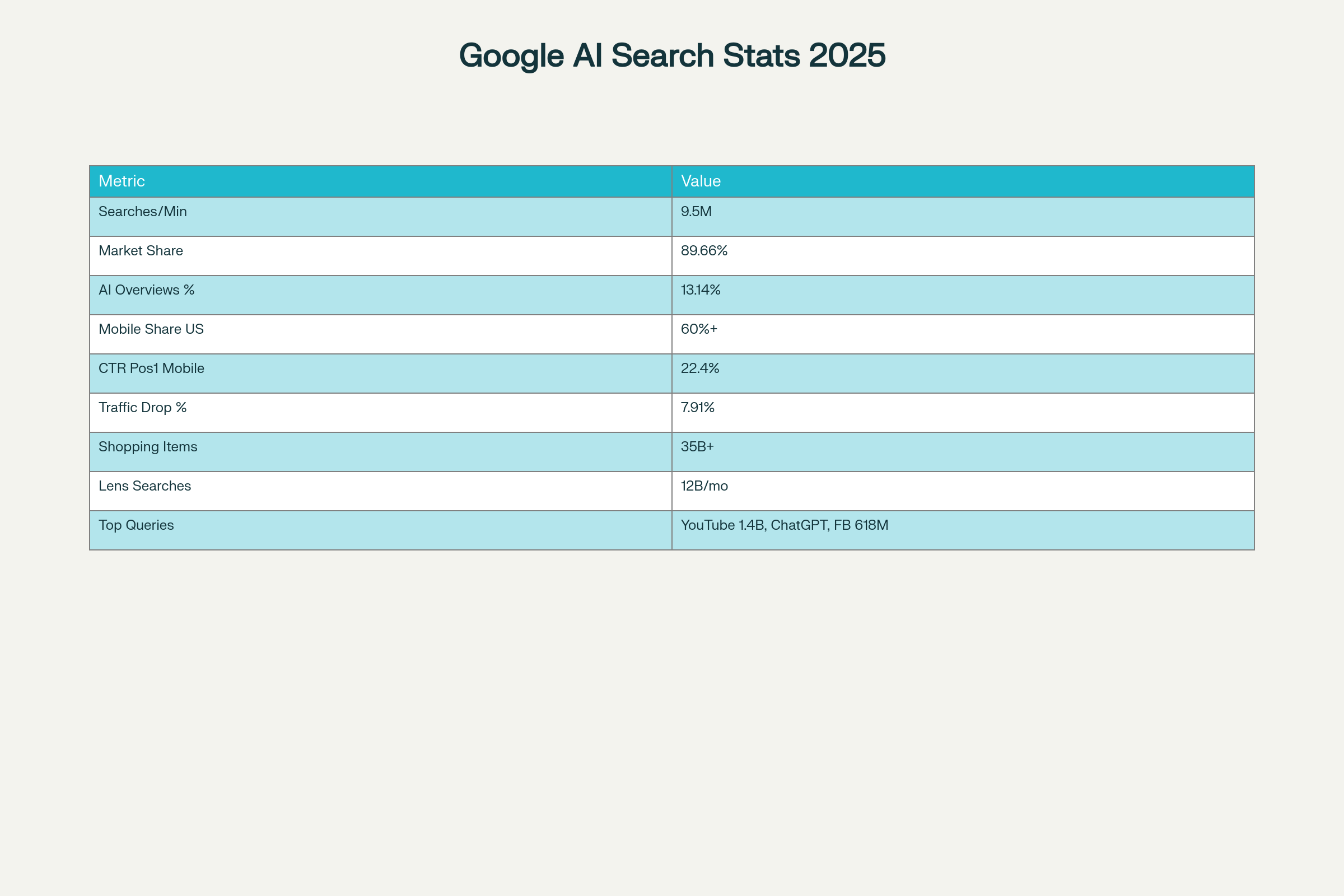
The rise of the “Google AI search engine”—driven by AI Overviews and AI Mode—has radically reshaped search behavior, visibility opportunities, and digital marketing outcomes. Businesses must adapt their SEO and content strategies to thrive in this new ecosystem, focusing on delivering high-quality, authoritative, and experience-based content to appear in AI-generated results.
Introduction: The New Frontier in Search

The search landscape in 2025 is undergoing its biggest transformation in decades. Google has integrated advanced generative AI, launching features like AI Overviews, AI Mode, and the Gemini 2.5 Pro model. These changes mean queries are answered directly, thorough topic explorations are encouraged, and the requirements for SEO success have changed dramatically. Businesses aiming for growth must understand how to leverage the latest AI-powered search capabilities.
What is the Google AI Search Engine?
Google’s AI search engine refers to the new paradigm powered by generative AI models that can understand nuanced queries, synthesize information across sources, and deliver answers as interactive, multimodal summaries. Two main components drive this shift:
- AI Overviews: Appearing at the top of search results, these summaries answer user queries with AI-generated insights and source references.
- AI Mode: A dedicated, dialog-based interface enabling follow-up questions, comparisons, planning, multimodal input (text, images, voice, video), and source cards in sidebars.
Key Google AI Search Engine Statistics
| Statistic | Value |
|---|---|
| Google searches per minute | 9.5 million |
| Global search engine market share (Google) | 89.66% |
| AI Overviews appear in (%) of searches | 13.14% |
| Mobile device share (US) | Over 60% |
| Top-ranking CTR (organic, mobile) | 22.4% |
| Google global traffic decline after ChatGPT | 7.91% |
| Google Shopping Graph product listings | 35 billion+ |
| Google Lens searches per month | 12 billion |
| Most popular queries (2025) | YouTube (1.4B/mo), ChatGPT/Facebook (618M/mo each) |

Key Google AI Search Engine Statistics (2025)
How Google AI Search Engine Is Changing SEO & Digital Marketing
1. Visibility and Traffic Challenges
AI answers are provided directly in search results, causing significant declines in organic click-through rates (20–40%) and a large rise in zero-click searches—where users get their answers and never visit a site. For some industries, traffic drops as high as 60% have been recorded, especially for informational content publishers.
2. New Pathways to Be Discovered
However, being cited as a source in an AI Overview or appearing within AI Mode offers brands opportunities for durable visibility, higher trust, and more qualified engagement.
3. Experience-Led, Authoritative Content Wins
Google’s AI-powered search rewards original, experience-based, and authoritative content. Demonstrating expertise (E-E-A-T) and providing unique insights is essential to be surfaced in AI answers.
4. Multimodality and Follow-up
AI Mode enables users to interact using text, images, voice, and live video, and supports follow-up questions. Users can compare products, plan travel, and conduct complex research—all within a conversational interface.
5. Rapid Rollout and Global Reach
AI Mode is now available in English in over 180 countries, with expansion to other languages (Spanish, Hindi, Indonesian, Japanese, Korean, Brazilian Portuguese). Visibility via these methods is growing fast and already exceeds 80–84% for most queries in major markets, narrowing the gap where classic results dominate.
Table: How Google AI Mode Differs From Classic Search
| Feature | Classic Search | AI Overviews | AI Mode |
|---|---|---|---|
| Interface | List of links | AI block above | Dialog tab, full-screen, chat |
| Interaction | Static, query-by-query | Single answer | Follow-ups, planning, context persistence |
| Source Selection | URL ranked by algorithm | Top results + AI | Curated, multimodal, volatile |
| Input | Text | Text | Text, voice, image, video, context |
| Utility | One-shot answers | Direct summary | Exploratory, agentic, complex tasks |
Q&A: Common Questions About Google AI Search Engine
Q: What is the biggest change brought by Google AI search engine?
AI no longer just delivers links; it generates direct answers, enables follow-ups, understands nuance, and can process multimodal queries (text, images, voice, video). This makes search more conversational, agent-like, and task-oriented.
Q: How can my business appear in AI Overviews or AI Mode results?
Focus on high-quality, original, experience-based content. Use structured data and author bios to boost credibility. Make information clear, trustworthy, and uniquely valuable to users. Expertise is a core factor for selection.
Q: Will traffic to my website decrease with AI results?
Yes, overall organic CTR drops as AI answers keep users on Google; yet, brands cited in summaries often gain higher-quality leads and greater trust, sometimes offsetting lower traffic.
Q: Is AI Mode available worldwide?
As of October 2025, AI Mode is integrated into English search across 180+ countries, with global expansion to several major languages.
Q: Should I stop investing in SEO?
No. SEO is evolving rapidly, not disappearing. To win in the AI search era, invest in content that answers detailed questions, displays expertise, and can be cited in AI results. Traditional keyword obsession should give way to real-world relevance and intent-based topics.
Action Steps for Digital Marketers & Businesses
- Create value-driven, experience-led content tailored to answering complex user queries.
- Monitor your site’s appearance in AI Overviews and Mode—not just traditional rankings.
- Update SEO strategy for multimodal, conversational queries.
- Employ structured data—schema for authors, organizations, FAQs—to boost AI visibility.
- Leverage new ad formats designed for AI summaries and conversational results, as paid traffic patterns may also shift with AI Mode.
- Diversify digital presence: Pursue omnichannel marketing, as younger audiences increasingly use social media platforms for search and discovery.
Conclusion

Google AI search engine—in the form of AI Overviews and Mode—is changing the rules of visibility and engagement for businesses and marketers. Those who adapt quickly by focusing on authoritative, experiential, and expert content will maintain their market share and attract high-value clients, even as traditional search paradigms dissolve.

